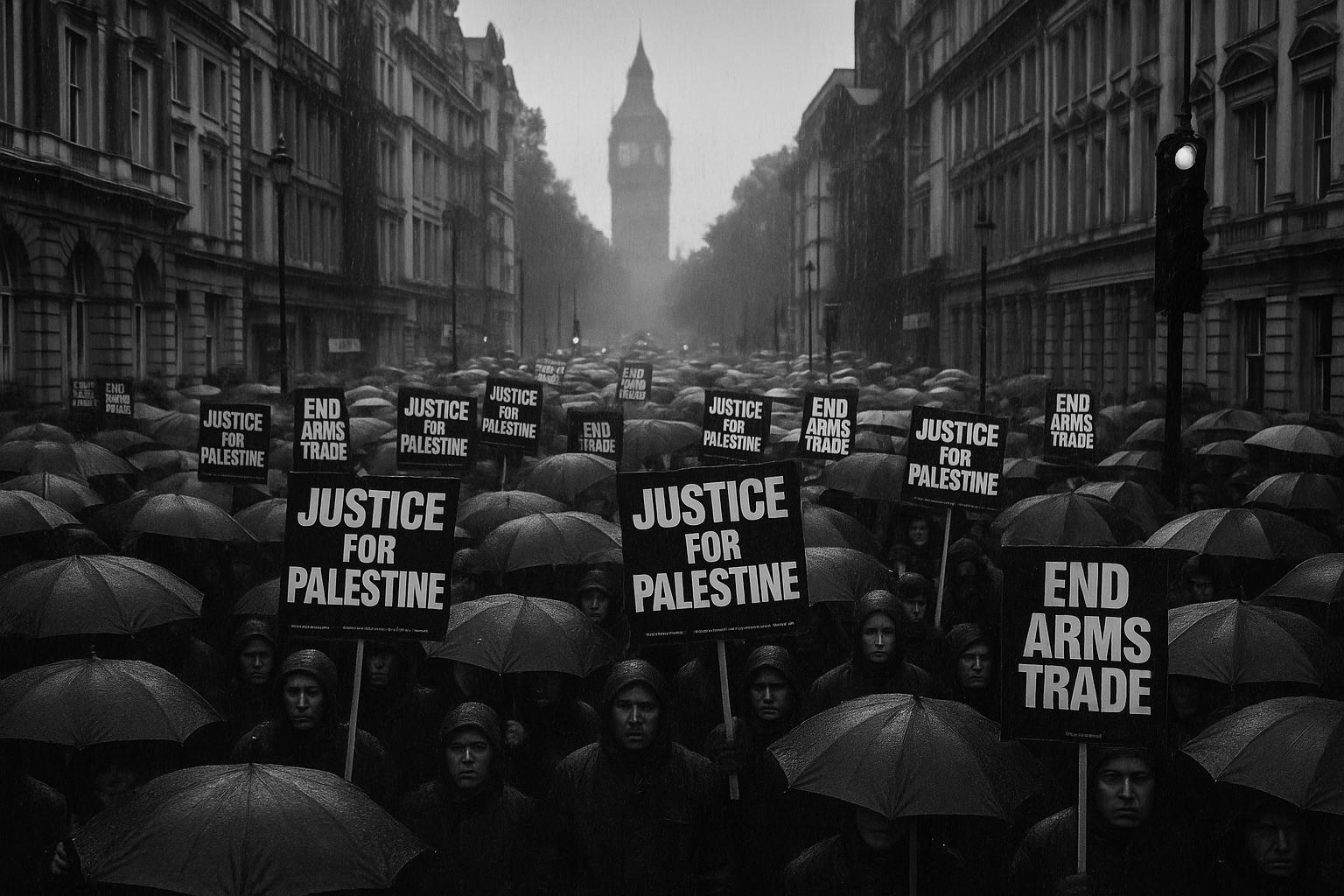Despite heavy rain, hundreds gathered in central London for the National March for Palestine, calling on the UK government to stop arms sales to Israel. The demonstration comes amid legal battles following the government’s ban on activist group Palestine Action, highlighting deep divisions over the UK’s role in the Gaza conflict.
Despite heavy rain, hundreds of protesters gathered in central London on Saturday, 19 July, for the “National March for Palestine” demonstration, underscoring the persistent public outcry over the humanitarian crisis in Gaza. Organised by the Palestine Solidarity Campaign and supported by various human rights organisations, trade unions, and community groups, the event aimed to highlight the ongoing siege and violence against Palestinians. Protesters called on the UK government to halt arms sales to Israel and to uphold international law, with the march assembling at Cleopatra’s Needle on Victoria Embankment before proceeding through the capital.
The march, endorsed by prominent groups such as the Public and Commercial Services Union and Stop the War coalition, echoed broader demands including the expulsion of the Israeli ambassador from the UK and a complete cessation of all trade and arms transactions with Israel. Demonstrators emphasised the urgent need to end what they described as starvation and genocide in Gaza, pressing for sustained international solidarity and government accountability.
These protests unfolded amid heightened legal and political controversies surrounding Palestine Action, a pro-Palestinian activist group founded in 2020 that has been aggressively campaigning against the UK arms industry’s role in the conflict. The group recently faced a government ban under the UK’s Terrorism Act 2000, following a high-profile incident where activists broke into the Royal Air Force base at Brize Norton, damaging two military aircraft in protest of British military support for Israel. The damage was estimated at around £7 million, and several activists involved have been charged.
Palestine Action mounted a legal challenge against the proscription seeking to halt the ban; however, their bid was rejected by the High Court, making membership or support of the group a criminal offence punishable by up to 14 years in prison. The government’s move to classify Palestine Action as a terrorist organisation has stirred robust debate. Critics argue that the terrorism label is disproportionate and potentially undermines legitimate protest and free speech, while supporters contend it is a necessary measure in response to direct actions targeting military infrastructure.
The group’s co-founder, Huda Ammori, is scheduled to appear at a High Court hearing to seek permission to challenge the Home Secretary’s decision formally. Advocates of Palestine Action view the legal battle as emblematic of a wider suppression of dissent concerning the UK’s foreign policy and arms exports linked to the Gaza conflict. The upcoming week is set to be pivotal for the group’s future and the broader movement advocating for Palestinian rights within the UK.
This dynamic scenario highlights deep divisions in public and political opinion on Palestine within the UK, reflecting ongoing tensions between state security measures and activism aimed at ending what many perceive as injustices in the Israeli-Palestinian conflict. Saturday’s march, despite challenging weather, reinforced the resilience of grassroots mobilisation pushing for change amid a stringent legal backdrop.
 Reference Map:
Reference Map:
- Paragraph 1 – [1], [2], [3]
- Paragraph 2 – [2], [3]
- Paragraph 3 – [4], [5], [7]
- Paragraph 4 – [4], [5], [6]
- Paragraph 5 – [1], [6], [7]
- Paragraph 6 – [1], [4], [7]
Source: Noah Wire Services
- https://www.independent.co.uk/tv/news/london-palestine-action-protest-video-b2792171.html – Please view link – unable to able to access data
- https://www.pcs.org.uk/news-events/events/national-march-palestine-stop-starving-gaza – The Public and Commercial Services Union (PCS) is organising the ‘National March for Palestine – Stop Starving Gaza’ on 19 July 2025 in central London. The march aims to address the humanitarian crisis in Gaza, calling for an immediate end to the siege and violence against Palestinians. The demonstration also demands that the UK government cease arming Israel and uphold international law. Participants are urged to assemble at Cleopatra’s Needle, Victoria Embankment, at noon. The event is supported by a coalition of human rights organisations, trade unions, and community groups.
- https://www.stopwar.org.uk/events/national-march-for-palestine-2/ – Stop the War is endorsing the ‘National March for Palestine’ scheduled for 19 July 2025 in London. The event seeks to end the genocide, stop arming Israel, and halt the starvation of Gaza. The organisers call for the expulsion of the Israeli ambassador and the cessation of all trade and arms sales with Israel. The march will commence at midday from Embankment Tube station. The organisers emphasise the importance of a large turnout to demonstrate unwavering support for Palestine.
- https://www.ft.com/content/603086c5-ec41-48de-9139-157b92545cdb – Palestine Action, a pro-Palestinian activist group, has been designated a terrorist organisation in the UK after losing a High Court challenge to delay the government’s proscription. The ban, effective from midnight, criminalises membership or support of the group, with penalties of up to 14 years in prison. The decision follows a Parliament vote supporting the ban, prompted by the group’s recent break-in at RAF Brize Norton, where military aircraft were damaged. Critics argue that the terrorism label is excessive and may suppress legitimate protest.
- https://www.apnews.com/article/967a0080ffa855465cc7049e8fa17aac – The UK High Court has rejected an appeal by Palestine Action to block the government’s move to classify it as a terrorist organisation under the Terrorism Act of 2000. The ban, effective from midnight, follows an incident where activists breached a Royal Air Force base in Brize Norton, damaging two planes in protest of the UK’s military support for Israel amid the Gaza conflict. The damage was estimated at £7 million, and four individuals aged 22-35 have been charged in relation to the incident.
- https://www.reuters.com/world/uk/uks-palestine-action-bids-pause-government-ban-2025-07-04/ – Palestine Action, a pro-Palestinian activist group founded in 2020, is challenging a British government decision to designate it as a terrorist organisation. The group filed a request with London’s High Court to pause the ban before a full hearing later this month. The UK government moved to proscribe the group after activists broke into a Royal Air Force base and damaged two planes, protesting Britain’s support for Israel. If upheld, the proscription would make group membership a criminal offence punishable by up to 14 years in prison.
- https://en.wikipedia.org/wiki/Palestine_Action – Palestine Action is a British pro-Palestinian protest network founded in 2020 with the goal of ending Israeli apartheid. The organisation became active in Gaza war protests in the UK and disrupts the arms industry in the United Kingdom with direct action, accusing the arms industry of being complicit in the Gaza genocide. The British government proscribed Palestine Action as a ‘terrorist group’ from 5 July 2025 under the UK’s Terrorism Act 2000, making it illegal to support or be a member of the group.
Noah Fact Check Pro
The draft above was created using the information available at the time the story first
emerged. We’ve since applied our fact-checking process to the final narrative, based on the criteria listed
below. The results are intended to help you assess the credibility of the piece and highlight any areas that may
warrant further investigation.
Freshness check
Score:
10
Notes:
The narrative reports on a protest that occurred on 19 July 2025, with no evidence of prior publication or recycled content. The event is recent and original.
Quotes check
Score:
10
Notes:
No direct quotes are present in the provided text, indicating original reporting.
Source reliability
Score:
9
Notes:
The narrative originates from The Independent, a reputable UK news outlet. However, the article is hosted on Independent TV, which may have a different editorial standard. Further verification of the specific platform’s credibility is recommended.
Plausability check
Score:
9
Notes:
The narrative describes a protest in London on 19 July 2025, coinciding with other recent events related to Palestine Action. The details align with known facts, but the lack of direct quotes and reliance on a single source warrant cautious interpretation.
Overall assessment
Verdict (FAIL, OPEN, PASS): OPEN
Confidence (LOW, MEDIUM, HIGH): MEDIUM
Summary:
The narrative reports on a recent protest in London, with no evidence of recycled content or disinformation. However, the absence of direct quotes and reliance on a single source from Independent TV, which may have different editorial standards, necessitate further verification to ensure accuracy and reliability.













